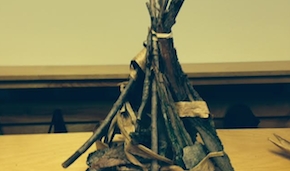Lower School students at Kent School are exploring a sense of their place in the world and their relationship to it. Their studies range from a micro exploration in second grade where students are mapping the school playground to a macro exploration in third grade where students are learning about world cultures and literature. In fourth grade the exploration returns closer to home with a focus on Maryland history and Chesapeake Bay Studies.

4th graders at the Kent School built wigwams as part of a curriculum that helps students develop a sense of place in the world.
Second grade students are using a multi-disciplinary approach to map the Kent School playground. In this long term project, students are first creating a map key followed by a sketch of the playground itself. As a final step the students will work together to create a larger scale map to include points of interest and a key to other characteristics of the school playground. The mapping exercise incorporates fine motor skills, spatial awareness, social studies, and collaborative learning.
In third grade, the curriculum for the year explores the world through geography, literature, music, and art. As part of their inter-disciplinary studies, third grade students participate in a global triangle exchange with schools in England and Tanzania. Kent School is working with The Rafiki Group. According to the Rafiki Group website,”The primary aim of the group is to develop a strong ethos of the global village for the pupils of all schools, creating a strong channel of communication between pupils to deliver understanding of differing and shared beliefs, values and concepts. To achieve this global village ethos all schools commit to two core objectives:
1. To develop the knowledge and skills so that individual pupils have a positive awareness of citizenship, and the confidence to make a contribution locally and globally. Vitally linked to this is a clear idea of our interdependence with personal responsibilities for contributions to that relationship.
2. Each school will endeavor to develop strong sustainability practice as a result of shared ideas, skills and knowledge.
For their role in the project, Kent School students are building and establishing a sustainable garden. Students will share their work, tools and results via letters, skype, blogs and other correspondence with the students are other participating in the Rafiki global project.
The theme of Sense of Place returns a bit closer to home in fourth grade as the curriculum focuses on Maryland history and Chesapeake Bay Studies. Fourth grade students experience a hands-on, multi-disciplinary approach that includes history, art, literature, language arts, and science. Recently, students worked in small groups to build wigwams. They used all natural materials to create miniature shelters like those made by the Nanticoke tribe on the Eastern Shore of Maryland and their allies, the Piscataway tribe on the Western Shore. To further bring this culture to life, guest lecturer, Chris Cerino will come to the class on October 9 bringing Native American artifacts found in the area. Later in the month, acclaimed local artist, Marc Castelli with teach a class on Native American culture and customs through art.
Headmaster, Chris Gorycki said “These programs are wonderful examples of our daily commitment to fulfilling our mission to guide our students in realizing their potential for academic, artistic, athletic, and moral excellence. Our school’s family-oriented, supportive, student-centered environment fosters the growth of honorable, responsible citizens for our country and our diverse world. In every one of these classroom experiences our students are gaining knowledge, learning about the world around them, and the importance of their place in it. Our ultimate goal is the give our students the moral courage to act on their ideas for the benefit of themselves and others. At Kent School, we refer to this as ‘learning to make a difference.’”
For more information about Kent School visit www.kentschool.org or call 410-778-4100 ext. 110.



Write a Letter to the Editor on this Article
We encourage readers to offer their point of view on this article by submitting the following form. Editing is sometimes necessary and is done at the discretion of the editorial staff.